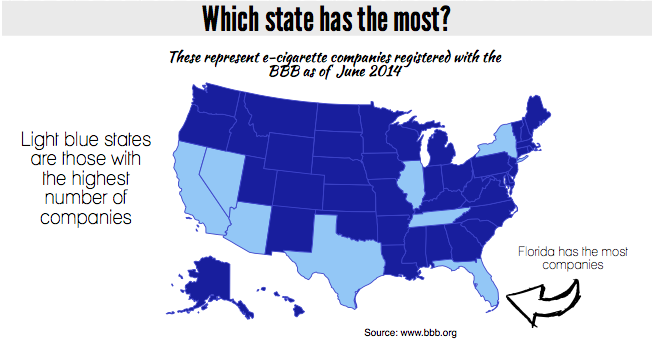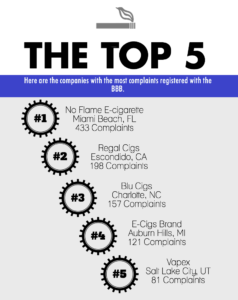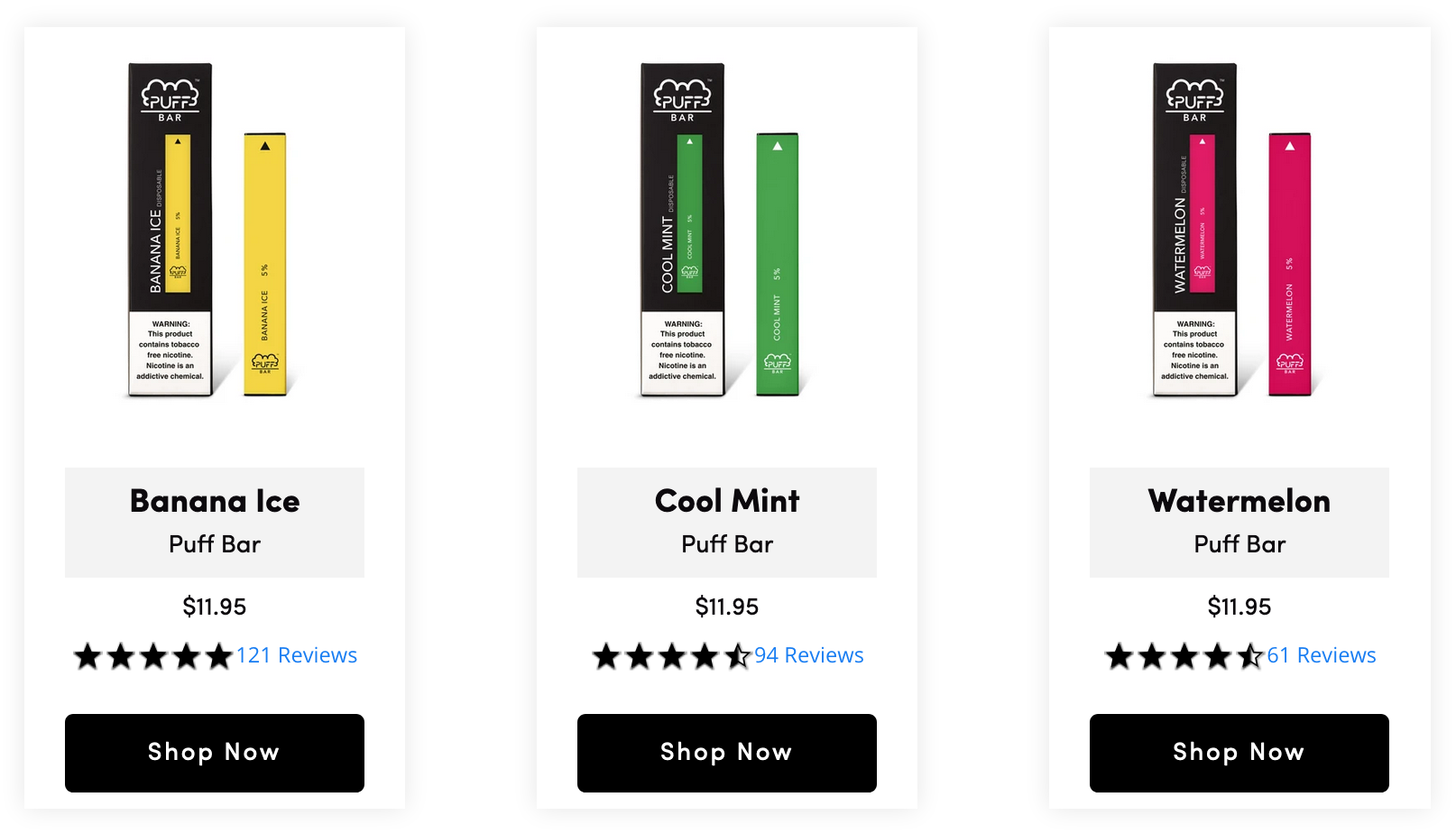
Best Reader Tips of 2021
This year reader tips led to dozens of ad alerts, as well as a complaint to regulators.
Consumers complain to feds that various e-cig companies are fleecing them into repeated credit card charges for vapor products.
|
Editor’s note: Since publishing this story several e-cigarette companies investigated by TINA.org — including one which was the subject of a TINA.org legal complaint — are now facing fines and have been cited by Utah consumer protection officials for deceptive advertising. The FTC said one of the companies, Vapex, is no longer in business. Scroll to end of article for complete update.
While the debate continues about whether e-cigarettes are a safer alternative to tobacco cigarettes and the FDA rolls out its regulations, one thing is for sure. Consumers are curious about trying the new products and many companies are out in force – especially on the Internet — capitalizing on this interest by offering free trials and special deals. But many of these special deals are not deals at all and hundreds of consumers say they’ve gotten ripped off.
The FTC has received about 600 consumer complaints against e-cigarette companies. The vast majority of consumers, according to a review of the complaints obtained by TINA.org through an Freedom of Information request, say they signed up for a free product or a supply at a reduced price but then the company repeatedly charged their credit and debit cards, sometimes wiping out their accounts. Others complained about:
Proliferating sites
The e-cigarette market is expanding at a rapid pace in the U.S., and is projected to reach more than $2 billion in sales this year. A recent study by the University of California San Diego Moores Cancer Center found that about 10 new e-cigarette brands are being introduced online each month. The study showed an 86 percent increase from 2012 to 2014. And a third to half of all sales from the brands are being made in what has been a largely unregulated online frontier. The UCSD study noted that brands are proliferating online because it costs very little to set up a website to hawk the products.
Aggressive marketing

TINA.org’s investigation found that companies are using a variety of aggressive tactics to attract consumers, including placing pop-up ads on popular national websites.
Consumers told the FTC they also received texts, spam emails and/or harassing calls from companies, and some were offered products after taking an online survey.
Several sites offered consumers the chance to not just buy the product, but to earn money as well by posting banner ads and links for the products on their own webpages or by becoming affiliates.
Many sites are playing up health issues, advertising that e-cigarettes are safer than tobacco cigarettes, though health officials haven’t determined that and some states, such as California, has even issued warnings not to use the products.
More than 50 companies were named in the FTC complaints and a TINA.org investigation has found that many of the companies are marketing products under slightly different names through various websites, making it difficult for consumers to contact the actual company selling the products. One Florida address is linked to about 20 different e-cigarette websites and another in the state is linked to at least 25.
Marketed as healthier
Many consumers said they were interested in trying e-cigarettes because they wanted to give up smoking and thought the tobacco-free products were healthier for them. (The UCSD study found that 11 percent of newer brands and 10 percent of older e-cigarette brands made direct claims that their products could help users stop smoking tobacco cigarettes.) But it turns out that trying the product was very unhealthy for their wallets.
Rising consumer frustration

The FTC complaints reveal growing frustration with questionable– if not outright illegal– tactics companies are using to sell their products. (Emphasis added in bold.)
Said one consumer in an FTC complaint:
I ordered the No Flame E-Cigarette online on 11/4/12. My credit card was charged $4.95 on 11/6/12. However I didn’t receive the trial kit until 11/15/12. My order confirmation stated that I would receive the product in 3-5 days, however, the package wasn’t received until 11 days after my order. The paperwork that came with the kit states that you may return the product for a refund, but you must call customer service for a Return Authorization Number and return the kit within 30 days. Also, the kit must be in reusable condition. How can you [possibly] return a kit in reusable condition when you have to open the package and put the cigarette in your mouth? Today I discovered that my checking account was charged $99.67. I called the company today 11/19/12 to let them know that I was unhappy with the product and would like to return it (It tastes terrible). They informed me that I was supposed to call within 14 days of PLACING THE ORDER in order to get a refund. I complained and told them that was not really fair as I didn’t even receive the order until 11/15/12 and the paperwork states that I have 30 days to return the product for a refund. False advertising!
The FTC has received more than 100 complaints against NoFlame, a Florida-based company. The BBB, which received 426 complaints against it, gave it an “F” rating. The site has recently changed its offer but still enrolls customers in a monthly payment program.
Another consumer had a problem returning a “free” product.
After completing a brief online survey I was to receive a choice of free product. I choose a ‘free’ E-cigarette. I received the product but was advised by someone that the product was not free and if I didn’t want to be charged for it I had to return it to the company within two weeks. I returned it… Since then they have emailed me twice saying that they hadn’t received the package. I ended up calling the post office in Florida and they said that the company had thousands of the packages that they had not picked up.
One woman said she ordered e-cigarettes as a way to quit smoking tobacco cigarettes but didn’t like it. She never expected to keep getting the product.
Today I [received] two boxes of 10 refill cartridges and my account was charged $149.90 back in February. It overdrew my account and I [received] charges of $125 for it. I have cancer and am trying to quit smoking. I thought this was a dream come true, something to help me quit. It has turned into a nightmare. …I am also on SS disability and don’t’ make ends meet as it is, this $149.90 really messed me up.
Deceptive advertising
Several consumers complained to TINA.org about Vapex, a Utah-based company that is linked to several different websites selling e-cigarettes. The company was the subject of more than two dozen FTC complaints and currently has an “F” rating from the BBB, which received more than 80 complaints.
TINA.org’s investigation found several deceptive marketing tactics used on various sites linked to Vapex, including promises of free trials that are neither free nor true trials, unsubstantiated claims that e-cigarettes save consumers money, fake testimonials, and a claim that it was the winner of a 2013 E-cigarette taste test that TINA.org could find no proof existed.
Consumers who signed up for “free trials” were particularly frustrated about Vapex’s response to their complaints and differing contacts listed for the company. One consumer said he ordered a free e-cigarette kit from vapexecig.net but when he called the company to complain about a charge for $99.95 he was told there was nothing the company could do because the product was sent by Vapor Ultra. When the consumer called the number the Vapex representative gave for Vapor Ultra, he said it was a non-working number. The charge on his credit card was from Vapor Ultra, though Vapex’s name was on the package’s return address.
Earlier this month, TINA.org sent letters to five different addresses linked to Vapex, including the address the company listed in its Utah incorporation papers, alerting it to the deceptive advertising issues and saying if it didn’t cease the practices TINA.org would file a complaint with the FTC and Utah Attorney General. Vapex did not respond. (See TINA.org’s complaint to the FTC here.)
One of the addresses was for Arizona-based OZN Web, LLC, which said through its attorney that it was contracted by Vapex to “market” its websites. The attorney, Charity Clark, said OZN has no control over the content on Vapex sites and is not responsible for any deceptive advertising. She said OZN is no longer marketing for Vapex and that its own domains, Vaperxs.com and TriVaper.com haven’t been active since January. However, FTC records obtained by TINA.org under an additional Freedom of Information request shows that a consumer who signed up for a two-week trial of electronic cigarettes complained that his credit card was repeatedly charged by VaperXS, including as recently as March. The March charge, he said, came Green Coffee Supra, a site also owned by OZN that sells green coffee extract weight loss supplements.
Wild West
 Vapex is among the top five companies with the most complaints to the BBB, which lists 521 e-cigarette companies. Of those, it has given 17.5 percent an “F” rating. The complaints to the BBB regarding e-cigarette companies touch on similar issues as the FTC complaints. Consumers reported problems with auto shipments, unauthorized credit card charges, difficulty reaching the company, and return issues.
Vapex is among the top five companies with the most complaints to the BBB, which lists 521 e-cigarette companies. Of those, it has given 17.5 percent an “F” rating. The complaints to the BBB regarding e-cigarette companies touch on similar issues as the FTC complaints. Consumers reported problems with auto shipments, unauthorized credit card charges, difficulty reaching the company, and return issues.
Despite the complaints, there has been very little regulatory action. The sheer number of sites and brands has made enforcement difficult, said Sharon Cummins, one of the authors of the UCSD study.
Government regulators have mostly been focusing on the issue of safety and marketing to minors. TINA.org could find only two states that took action to protect consumers against purchasing scams.
In 2011, Arizona went after Smoke Freely, LLC (aka smokefreely.com and Prado). The company – which according to the BBB listed “Mr. Stacked” as its owner and “Sherrie Shorty” as its complaint handler — reached a $10,000 settlement in 2012 with the state requiring that it prominently disclose its terms and conditions associated with its free trial offer, give consumers specific information related to when their accounts would be debited, clearly disclose shipping and handling and restocking fees, and give an additional five days for shipping when calculating the date when a free trial period ends.
Florida’s Attorney General in 2011 reached a similar settlement with Direct E-cig after an investigation found that the company’s “free trial offer” didn’t adequately disclose the details of its cancellation policy. The company issued refunds and agreed to change its marketing to ensure that consumers could view its full terms and conditions, cancel the negative option plan that led to repeated monthly charges, and have at least 14 days from the shipment of a product to request a refund.
To date, the FTC has not taken any action against e-cigarette companies and it could be years before the FDA finalizes its regulations of the industry.
Benjamin Edelman, an associate professor at Harvard Business School who specializes in Internet fraud, said deceptive sellers are hiding in plain sight as the debate about health takes center stage. He said:
The focus on safety has made it all too easy not to pay attention to marketing practices, (such as) bait and switch, automatic renewals…recurring charges, lack of required notice before recurring charges. There is a veritable laundry list of these kinds of malfeasance and folks should be asking questions about that too and not just health effects…Sellers in gray areas take additional liberties and consumers should be especially vigilant.
Look before you vape
Many consumers said they didn’t check out the companies until they started having problems. Before you consider trying e-cigarettes through any kind of offer – especially unsolicited offers – you should:
Take action
If you feel you have been the victim of a scam, here’s how to file a dispute with your credit card company. To file a complaint about an e-cigarette company, click here. Read more here about e-cigarette marketing.
Check back for updates from TINA.org, which will continue to cover deceptive e-cigarette marketing claims.
UPDATE: Utah consumer protection officials in August 2014 cited Vapex for 329 counts of violating multiple consumer laws, including advertising risk free starter kits that weren’t free, and for claims that the vaping product was a healthy alternative to traditional cigarettes and could be smoked anywhere. The company potentially faces a maximum fine of $822,500. The state’s Department of Commerce also cited Sinless Vapor for 94 counts and it faces a potential fine of $235,000. The department also disclosed that it reached a settlement in June with OZN Web LLC, which operated vaperxs.com, on 18 counts. The company, according to the department, admitted to the violations and agreed to remove all misleading advertising claims and pay a fine of $10,000 by December 2014. In addition, in February 2015, the FTC in a letter to Vapex said it was not going to recommend enforcement action because the company was no longer in business.
This story was updated several times, including most recently on 10/21/15.
This year reader tips led to dozens of ad alerts, as well as a complaint to regulators.
Supplement MLM takes down dozens of deceptive claims following TINA.org investigation.
FDA says it is aware of the situation but declined to comment on the regulatory status of disposable e-cigarette brand.


